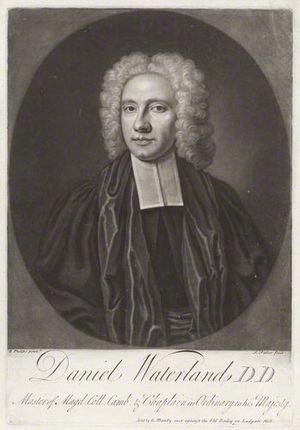Daniel Waterland facts for kids
Daniel Waterland (born February 14, 1683 – died December 23, 1740) was an English scholar who studied religion. He became the leader of Magdalene College, Cambridge in 1714. Later, he became a high-ranking official in the Diocese of York in 1722 and an Archdeacon of Middlesex in 1730.
Waterland often disagreed with people who had more flexible religious views at the time. He was a very strong debater who defended the main Christian belief about the Trinity (God as Father, Son, and Holy Spirit). He wrote several long papers about this. He also wrote a book called History of the Athanasian Creed in 1724.
Contents
Early Life and Education
Daniel Waterland was born in Walesby, England, on February 14, 1683. He was the second son of Henry Waterland, who was a church leader in Walesby.
He went to Lincoln Grammar School. Then, he studied at Magdalene College, Cambridge, starting in 1699. He became a scholar there in 1702 and a fellow (a senior member of the college) in 1704. He earned his first degree (B.A.) in 1703 and continued his studies, getting more advanced degrees over the years.
Life at Cambridge University
Waterland was a very dedicated person. He worked hard teaching students and helping with university matters. He was an examiner for different subjects in 1710 and 1711.
In 1713, he was chosen to be the Master (the head) of Magdalene College. He also became the leader of a church in Ellingham, Norfolk. In 1714, he had an important debate about different religious beliefs at the university.
In 1715, he became the Vice-Chancellor of the university. This was a very important leadership role. In 1716, he gave a sermon to celebrate the end of the Jacobite Rising of 1715, which was a rebellion against the king. He also met the Prince of Wales to offer congratulations.
In 1717, Waterland became a chaplain to the king. His writings and debates made him well-known. He also became the first lecturer for a special series called the Lady Moyer's endowment.
Important Church Roles
In 1721, Waterland was given a church leadership role in London at St. Austin and St. Faith. In 1722, he was appointed by Archbishop William Dawes to be the chancellor of the Diocese of York. This meant he handled legal matters for the church in that area.
He continued to gain more important positions. In 1727, he became a canon at Windsor, which is a church official at St George's Chapel, Windsor. In 1730, he became the Archdeacon of Middlesex and the vicar of Twickenham. At this time, he left his church role in London.
Later Life and Passing
In 1734, Waterland turned down the chance to lead a part of the church's governing body, called Convocation. He also later declined an offer to become a bishop in Wales.
Daniel Waterland passed away on December 23, 1740. He was buried in St George's Chapel, Windsor. In 1719, he had married Theodosia Tregonwell.
Key Writings
Daniel Waterland wrote many important books and papers, mostly about Christian beliefs.
One of his first major works was A Vindication of Christ's Divinity (1719). In this book, he argued against ideas that questioned the divinity of Jesus. He also wrote an Answer to a reply he received. His Eight Sermons in Defence of the Divinity of our Lord Jesus Christ (1720) were also very famous.
In 1723, he published his Critical History of the Athanasian Creed. In this book, he carefully looked at the history of the Athanasian Creed, which is an old statement of Christian faith. He suggested it was written around 430–440 AD.
He also wrote Scripture Vindicated (1730–1732). This was his response to a book that questioned traditional Christian beliefs. Another important work was The Importance of the Doctrine of the Holy Trinity Asserted (1734), which again defended the belief in the Trinity.
His book Review of the Doctrine of the Eucharist (1737) discussed the Christian sacrament of communion. Waterland's Discourse of Fundamentals (1736) is also seen as a key work. It talks about which Christian beliefs are "essential" and which are "non-essential."
Other works by Waterland included:
- The Case of Arian Subscription Considered (1721)
- The Scriptures and the Arians compared (1722)
- A Second Vindication of Christ's Divinity (1723)
- Advice to a Young Student (1730)
- Regeneration Stated and Explained (1740)
After his death, some of his other writings were published, including A Summary View of the Doctrine of Justification. A full collection of his works was published in 1823.
Modern Studies
Daniel Waterland's ideas are still studied today. For example, Ray R. Sutton wrote a doctoral thesis in 1998 about Waterland's views on sacraments. Waterland is also discussed in the book Reformation Without End (2018) by Robert G. Ingram.
 | Calvin Brent |
 | Walter T. Bailey |
 | Martha Cassell Thompson |
 | Alberta Jeannette Cassell |


